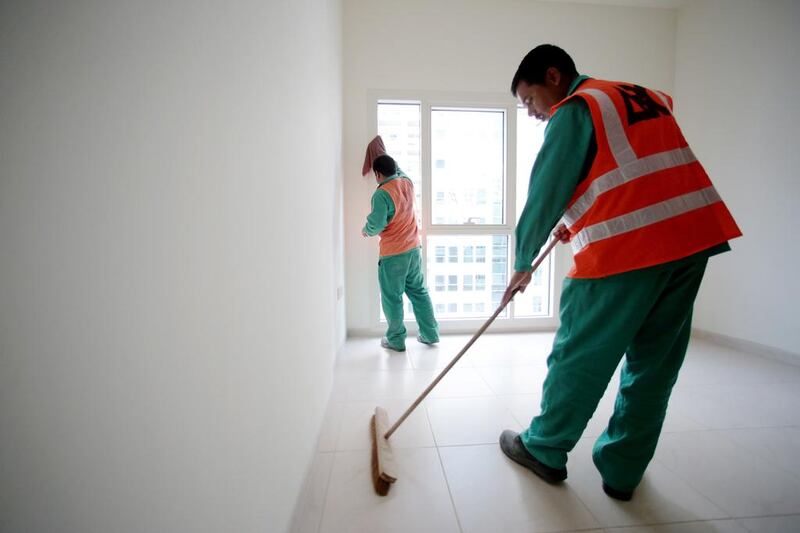Just thinking about his rent makes Karunakaran Gopalan want to leave his job as a mechanical engineer in Abu Dhabi and return to his newly built house in Kerala.
“I want to finish paying off my loans and then run away,” says Mr Gopalan, who works for Al Ryum General Contracting. “Accommodation and school costs are killer blows.”
For decades the UAE’s Dh175 billion construction industry has relied on expatriate Indian workers and professionals such as Mr Gopalan to build the skyscrapers, shopping malls and hotels that dominate the skylines of Dubai and Abu Dhabi.
But now a building boom at home driven by the economic reforms of the prime minister, Narendra Modi, is encouraging many would-be Indian emigrants to stay in India – forcing employers throughout the UAE to look farther afield to fill positions.
A second interest rate cut in India last week was the latest boost for the expanding construction sector, which the IMF expects to help propel GDP growth of 6.5 per cent next year.
“We haven’t hired any new Indian labourers. It’s difficult because the salary of labourers in India is more than before,” said Mahmoud Irshaid, a project manager at Abu Dhabi-based Al Mezin General Contracting.
Monthly salaries for Indian labourers have jumped to Dh1,600 from Dh1,200 two years ago on many sites in the capital.
“Lots of our Indian employees have resigned and moved back to India,” Mr Irshaid said. “The ones who stayed asked for increased salaries.”
Contractors such as Al Mezin and Al Ryum have switched to cheaper sources of labour.
“We aren’t hiring any new labourers from India – instead we’re hiring labourers from Pakistan, Afghanistan and Nepal, and some from the Philippines,” Mr Irshaid says.
“Ask anyone in the UAE,” he says. “They’ll say the same thing.”
Pakistani workers are paid about Dh1,000 per month, while some Nepalese labourers will work for Dh800 per month, Mr Irshaid says.
It is not just the construction economy that is being affected.
“There’s more work in India for all jobs these days. More Indians in the UAE have professional jobs than a few years ago,” says Abdul Nasser Ammunny, a manager at Raneh and Taneh Mobile Phone in Abu Dhabi.
He has lived in the UAE for 12 years but visits his family in India every year.
“There aren’t as many Indian construction workers in the UAE as there were three years ago. More are coming from Bangladesh, Pakistan and other countries,” he says.
Housing costs have risen rapidly in Dubai and Abu Dhabi as the country’s housing stock struggles to keep up with the influx of migrant labour. Higher rents and utilities have pushed inflation to above 4 per cent in both emirates. A particular shortage of cheap or mid-range housing options means that shortages and price rises are particularly acute for those on lower incomes.
Returning workers cite the increasing cost of living across the Arabian Gulf and harsh recruitment company practices as key reasons for their decision to return home, says Debajan Chakrabati, the general secretary of the Construction Workers Federation of India, a trade union based in Kolkata.
Exploitation by “unscrupulous recruiting agents” is a common complaint, he says, with many workers reporting having passports seized on arrival and receiving lower salaries than promised.
But the boom in infrastructure spending means that the standard of living for construction workers at home is improving.
“Metro lines are being opened and there is a lot of new spending on infrastructure,” says Naweed Khan, who is also a mechanical engineer at Al Ryum.
“Drastic changes in the power industry” and the new government’s taste for public-private partnerships have further lifted the construction industry at home, he said.
Not everyone believes that Mr Modi deserves all the credit for India’s new-found economic optimism.
Wages are not rising “because of Modi – wages were rising before Modi,” says Mr Ammunny. Wages are increasing “because there are more educated people and more professional jobs in India”, he says.
Family is a strong pull keeping labourers at home. It takes a sizeable wage differential to persuade construction workers to leave their families – and now that it is falling, fewer are willing, adds Mr Irshaid.
Mr Khan, however, still has no immediate plans to return to India. He says he will wait for the gap between wages here and in India to narrow more before returning, and is confident that this will happen eventually.
As an engineer with a degree from Gulbarga University in Karnataka, Mr Khan earns Dh13,000 per month working in Abu Dhabi. He would earn about Dh10,000 were he to return to India, but his income would be taxed.
Still, rising rents may make him contemplate a return sooner.
“I spend 35 per cent of my salary on rent. If accommodation costs go up, it would be the same, working in India versus working here.”
But Mr Gopalan, his co-worker, is itching to leave. Once he pays off the loans needed to build his Kerala home he will be heading for the airport.
Then he will never have to pay rent again, he says with a smile.
Additional reporting by Rebecca Bundhun in Mumbai and Lucy Barnard in Abu Dhabi.
abouyamourn@thenational.ae
Follow The National's Business section on Twitter





